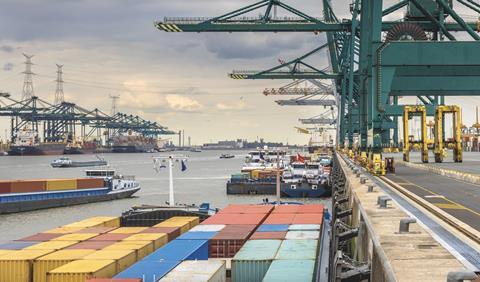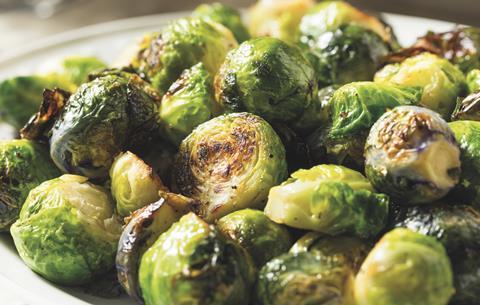A new transatlantic logistics service is gearing up to transport EU fresh produce from the Port of Antwerp to Pennsylvania, as Benelux exporters eye niche trade opportunities in certain vegetable categories
Foodcareplus, a Belgian provider of fresh produce logistics services, is preparing to launch a comprehensive new service for the consolidated shipping of fruit and vegetables from the Benelux and France to the US.

The pioneering new offer, called Fresh Produce Express Service, is a collaboration with third-party logistics provider Sunrise Logistics and Independent Container Line.
Its start date will be announced at the Global Produce & Flora Show in Atlanta on 17-19 October.
The streamlined service will truck produce from a consolidation point in the Belgian town of Sint-Katelijne-Waver to the Port of Antwerp. From there, goods will be shipped to Penn Terminals near Philadelphia, before being transferred by road to the Sunrise Logistics coldstorage facility in Ephrata, Pennsylvania.
The Sunrise depot spans approximately 400,000ft2 and can accommodate all kinds of fresh produce at a wide range of temperatures. It also offers packing and ripening services, as well as quality control and on-site USDA inspections.
Foodcareplus says the total transit time will be roughly two weeks, leaving enough time to market the produce through wholesale and retail channels in the US. The fresh produce will be shipped in mixed containers, allowing EU exporters to supply US wholesalers and complement larger volumes from domestic and Latin American suppliers.
In the US, wholesale remains an important channel and supplies all major supermarkets, as well as the independent retail market. Doing business directly with big US supermarkets generally isn’t possible unless a supplier sends large volumes of produce.
So the aim of the Fresh Produce Express Service is essentially to allow EU producers to act like a domestic supplier. Foodcareplus will handle all transit costs and paperwork involved, enabling them to have a more direct relationship with US wholesalers.
Foodcareplus co-director Steve Alaerts stresses, however, that the European exporter still bears the risk if produce is delayed or damaged in transit.
Diego Barriga, who works alongside Alaerts as Foodcareplus’s other director, explains: “As part of our commitment to providing a seamless and efficient service, we’ve ensured that the Fresh Produce Express Service offers comprehensive integration with our shipping partners. This allows for smooth coordination between the consolidation of produce in Belgium and its timely arrival in the US market.
”The partnership with Independent Container Line and Sunrise Logistics ensures that every step, from shipment to distribution, is streamlined to maintain the highest standards of freshness and reliability.”
‘Brilliant’ opportunity
The new logistics service aims to capitalise on new market opportunities for certain EU produce in the US, particularly vegetables. Alaerts says there is “a brilliant opportunity to complement the US market, especially on the east coast, with produce from Belgium, such as Brussels sprouts and endives”.
He adds that European vegetables more generally, and particularly root veg, have strong potential in US markets due to growing demand from European diaspora communities. In cities like Chicago, with large European-origin populations, these communities seek familiar items that suit their culinary traditions. This creates considerable opportunities for EU exporters.

Over the last ten years, fresh produce imports to the US have risen by 26 per cent in volume – mainly from other countries in the Americas such as Mexico, Peru, Chile, Guatemala and Costa Rica. But Alaerts sees opportunities for EU produce to enter the market too, albeit in smaller volumes.
As it stands, the EU accounts for just 0.4 per cent of fresh produce imports to the US. This amounted to just 37,000 tonnes (€84.5m) in 2023. There were no import volumes from Belgium to speak of, and only minimal volumes from the Netherlands.
Nevertheless, Tineke Van de Voorde of the Port of Antwerp echoes Alaerts’ optimism, saying the US is a “dynamic market that is increasingly diversifying its sources of fresh produce”.
Mike Laws of Sunrise Logistics notes that American retailers generally prefer to buy produce domestically if possible – since costs and supplies are more predictable, and because there is a complex regulatory landscape for agricultural imports to the States.
However, if the price and quality of imports can match or beat domestic produce, Laws sees real opportunities for EU produce to fill gaps in domestic US production – provided it can be delivered efficiently to the retailer’s door.
Laws adds that EU imports give the US wholesale and foodservice sectors an excellent opportunity to add value to their customers by providing access to produce that would normally be in limited supply.
Shopping around for deals
Commenting on the current state of the US fresh produce market, the International Fresh Produce Association (IFPA) notes that due to the cost-of-living crisis, US shoppers are switching spend to the discounters and shopping around for better deals. However, research shows that quality and perceived value remain paramount to consumers.
US household penetration in fruit and vegetables was steady in 2023, with consumers buying fresh produce 67.4 times a year, up 0.2 per cent on 2022. Anouk Sijmonsma of the IFPA says there are opportunities to expand sales to baby boomers, as they are less well understood by US brands and retailers, and families with children, who can be encouraged to snack on fruit and veg from an early age.

Jeroen Buyck is CEO of Belgian fresh produce exporter Calsa and president of Fresh Trade Belgium. He says the organisation will support the new service as much as possible because it makes exports more efficient and cost-effective in the face of restrictive EU regulations and the “oligopoly” of global logistics companies and container lines.
In most fruits and vegetables, the EU already has the necessary permits and phytosanitary certificates to access the US market, but in some vegetables – like celeriac, parsnips, radishes and beetroot – no prior request has been made to the US Food and Drug Administration, which regulates imports. Nevertheless, Foodcareplus assures European exporters that this is unlikely to prove a major hurdle.
This interview was taken from Fresh Focus North America, a new publication from Fruitnet, available now



